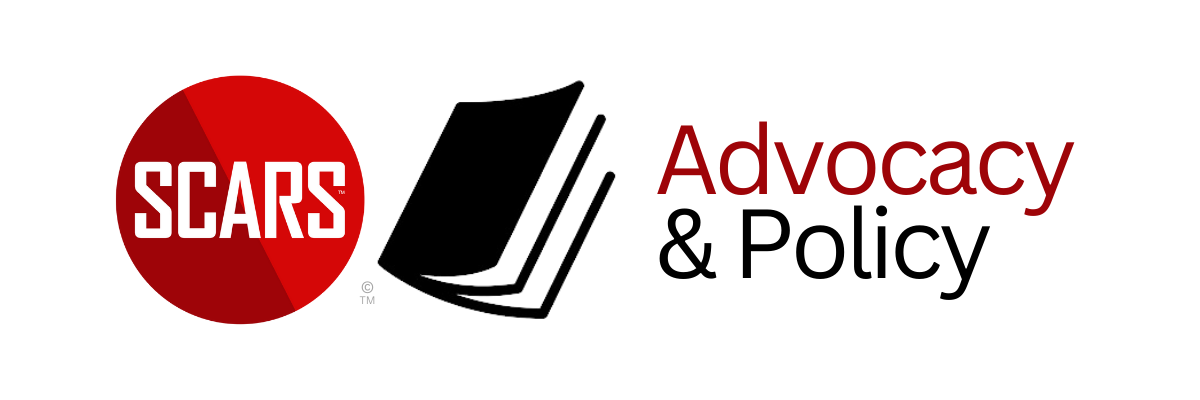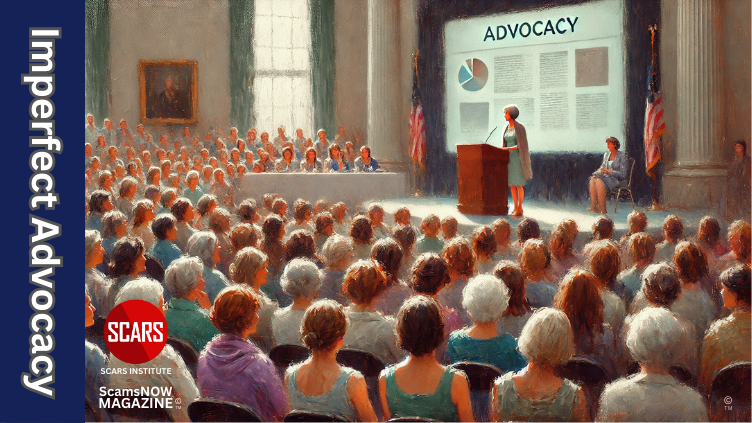
Imperfect Advocacy – Good Advocates are Not Perfect
Imperfect Advocacy: We Are Good, But Not Perfect, And That’s Where Our Greatest Potential Lies (For Scam Victim Advocates)
Primary Category: Scam Victims’ Advocacy
Author:
• Debby Montgomery Johnson, President and CEO of BenfoComplete.com, Online Scam/Fraud Survivors Advocate, Author, Keynote Speaker, Trainer, Podcast Host, USAF Veteran, Chair and Director of the Society of Citizens Against Relationship Scams Inc.
See Author Biographies Below
About This Article
Scam victim advocacy is not about being perfect. It is about being present, honest, and willing to grow. Imperfect advocacy means recognizing that even with the best intentions, mistakes will happen, emotions will get strained, and answers will not always be clear. Yet within that imperfection lies the greatest potential for real connection and long-term support. Advocates who acknowledge their own limits model emotional honesty, integrity, and self-compassion for the victims they support. They create safety by being trustworthy, not flawless. They serve not through grand gestures, but through consistency, listening, and humility. Advocacy, like recovery, is a process of growth. When advocates choose presence over perfection, reflection over performance, and service over ego, they become allies victims can rely on during the most vulnerable stages of healing. The power of good advocacy comes from humanity, not mastery. Every moment of care, even when inconvenient or uncertain, matters. The work is not easy, but it is worth doing, especially when done with heart, integrity, and the willingness to learn.
Note: This article is intended for informational purposes and does not replace professional medical advice. If you are experiencing distress, please consult a qualified mental health professional.

Imperfect Advocacy: We Are Good, But Not Perfect, And That’s Where Our Greatest Potential Lies (For Scam Victim Advocates)
Lessons Learned at the SCARS Institute
Imperfect Advocacy is about doing your best. In the emotionally demanding role of scam victim advocacy, it is essential to remember a core truth: advocates are good, but not perfect. This honest recognition is not a flaw in character or commitment. It is the very proof of humanity, and it holds the key to sustainable, compassionate, and trauma-informed support. Every advocate brings a mix of skill, empathy, experience, and limitations. Accepting these truths is not a compromise on standards. It is an opening to deeper understanding, more effective support, and personal growth.
Embracing the Imperfection Within the Advocate Role
Advocates often hold themselves to very high standards, sometimes impossibly high. When supporting a scam victim in crisis, it is easy to believe that any mistake, hesitation, or gap in knowledge could cause harm. The weight of responsibility is real. Yet believing that advocates must be flawless can lead to guilt, burnout, or emotional disconnection.
Advocacy, like recovery, is a process. It involves mistakes, hard lessons, and setbacks. When advocates acknowledge their own learning curves, they model self-compassion and authenticity for the victims they support. Being good means acting with integrity, listening well, and showing care. Not being perfect means making space to grow. Growth makes advocacy sustainable.
Mistakes and Limitations Are Growth Points
Every advocate will face moments of frustration or self-doubt. aA victim may lash out in pain. A support plan may fall apart. A trigger might be missed. Rather than internalizing these as failures, advocates can learn to see them as markers of involvement and care. Mistakes show where attention is needed. Limitations reveal areas to learn.
Instead of striving for control, trauma-informed advocates meet imperfection with reflection. They ask, “What was missing in that moment? What can I learn? Who can I ask for guidance?” When support efforts fall short, advocates do not need to abandon confidence. They can respond with accountability and a willingness to adjust.
Service Is Often Inconvenient, And That Is the Work
Scam victim advocacy is rarely convenient. The emotional labor is real. It includes sitting with discomfort, hearing painful truths, and showing up when the reward is invisible. Trauma does not follow a schedule, and victims often reach out during moments of panic or grief. Effective advocates learn to build boundaries while still offering presence.
Inconvenience, when framed correctly, becomes a test of values. Choosing to listen to a repetitive story, respond gently to a triggered outburst, or check in again when it seems unreciprocated is not martyrdom; it is dedication. Service does not have to be grand to be meaningful. Consistency, not perfection, builds trust.
Five Ways Advocates Can Serve Each Day
Advocates do not need to overextend or seek dramatic impact to be effective. These small daily habits strengthen trauma-informed care:
- Offer Validation Without Judgment: Scam victims often express confusion, shame, or self-loathing. Advocates can acknowledge these feelings without correcting them or minimizing their intensity. A simple “That makes sense, given what you’ve been through” can stabilize someone in emotional freefall.
- Listen More Than Direct: In early stages, many victims do not need answers, they need space to process. Advocates who hold silence and reflect back what they hear create powerful healing environments. Advice may come later, but listening should come first.
- Be Transparent About Uncertainty: Advocates are not therapists, law enforcement, or financial advisors. When a victim asks something beyond an advocate’s role, the most honest answer might be, “I don’t know, but I can help you find someone who does.” Transparency earns trust.
- Respect Emotional Fatigue: Sometimes, victims are too numb or flooded to engage. Advocates can normalize this. Saying, “It’s okay to rest today” respects the nervous system and invites recovery on its own terms.
- Reflect on Each Day’s Learning: At the end of each day, advocates can ask themselves, “What went well? What felt hard? What did I learn about myself or the person I was helping?” Self-awareness maintains empathy.
Becoming a Fully Present Advocate
Great advocacy does not come from mastery of all knowledge. It comes from humility, presence, and adaptability. Scam victims do not need perfect saviors. They need present allies. Allies who hold space without judgment, respond without ego, and support without seeking reward.
Every advocate can evolve. The journey includes days of deep satisfaction and days of discouragement. Both are part of the work. By recognizing their emotional responses, limitations, and moments of disconnection, advocates can care for themselves while caring for others.
The Power of Imperfect Goodness
In a perfection-driven world, choosing to show up as a good but imperfect advocate is radical. It tells victims that recovery does not require perfection either. It communicates that struggle is allowed, that growth is ongoing, and that human connection matters more than polished performance.
Trauma-informed care does not demand flawlessness. It demands awareness, intention, and care. When advocates embrace the full spectrum of their humanity, strengths, and all, they become safer, more effective, and more resilient. Their presence creates ripples of safety that can outlast the conversation.
In the end, the advocate who says, “I may not always get it right, but I am here, and I care,” does more good than the one who tries to perform expertise at all costs. This is what makes the work real. This is what makes the work matter.
Debby Montgomery Johnson
Glossary
- Advocacy – The intentional and sustained effort to support scam victims through education, protection, and empowerment, while honoring their trauma and respecting their pace of recovery.
- Authentic Service – A form of support offered without seeking validation, recognition, or control. It centers the victim’s needs, not the advocate’s emotional reward.
- Boundaries – Emotional, psychological, and practical limits that advocates maintain to avoid over-involvement, burnout, or reinforcing dependency in victims.
- Burnout – A state of emotional and mental exhaustion that can occur when advocates overextend themselves without proper rest, boundaries, or peer support.
- Cognitive Flexibility – The capacity to adapt one’s thinking, expectations, and assumptions when faced with new information, especially in emotionally charged situations.
- Compassion Fatigue (Vicarious Trauma) – The erosion of empathy and patience that can occur when advocates consistently absorb the distress of those they help without replenishing their emotional reserves.
- Cultural Humility – The ongoing commitment to self-evaluation and learning about the cultural backgrounds, values, and experiences of others without assuming expertise or superiority.
- Empathy – The ability to emotionally resonate with another person’s experience, without merging identities or projecting one’s own interpretations onto them.
- Ethical Advocacy – A disciplined and transparent approach to support that is guided by trauma-informed principles, clear communication, emotional honesty, and personal accountability.
- Growth Mindset – The belief that skills, understanding, and emotional capacity can improve over time through effort, feedback, and reflection.
- Helper Identity – The self-concept some advocates develop around being the one who helps, which can become harmful if it overshadows the actual needs of the people they serve.
- Imperfect Goodness – The honest acknowledgment that being helpful and ethical does not require perfection, but rather consistent effort, humility, and a willingness to grow.
- Inner Critic – The internal voice that judges, shames, or questions one’s worth as an advocate. It can become louder in the face of mistakes, but must be met with self-compassion.
- Interpersonal Integrity – The practice of aligning one’s words, values, and actions in support relationships, especially when trust is fragile.
- Overidentification – A loss of perspective that occurs when an advocate emotionally fuses with the victim’s experience, often leading to blurred boundaries and diminished objectivity.
- Peer Accountability – The willingness to receive feedback and correction from other advocates in order to prevent blind spots, overreach, or ethical drift.
- Projection – A psychological defense mechanism where unacknowledged feelings or fears are assigned to someone else. Advocates may unintentionally project their own unresolved experiences onto victims.
- Reflective Practice – The structured habit of looking inward after advocacy efforts to evaluate what worked, what didn’t, and what can improve without shame or avoidance.
- Resilience – The inner capacity to recover from mistakes, emotional fatigue, and uncertainty in order to continue offering meaningful support over time.
- Self-Awareness – The ability to observe one’s own motives, emotions, and reactions in real time, especially in moments of frustration, shame, or urgency.
- Service – A deliberate act of care offered to another person, not out of obligation or ego, but as an expression of values, compassion, and shared humanity.
- Shared Humanity – The acknowledgment that all people—including advocates and victims—are fallible, growing, and shaped by struggle. This recognition creates a foundation for nonjudgmental support.
- Trauma-Informed Care – A framework for support that emphasizes emotional safety, trustworthiness, empowerment, choice, and cultural sensitivity in every interaction.
Author Biographies
-/ 30 /-
What do you think about this?
Please share your thoughts in a comment below!
One Comment
Leave A Comment
TABLE OF CONTENTS
- Imperfect Advocacy: We Are Good, But Not Perfect, And That’s Where Our Greatest Potential Lies (For Scam Victim Advocates)
- Imperfect Advocacy: We Are Good, But Not Perfect, And That’s Where Our Greatest Potential Lies (For Scam Victim Advocates)
- Lessons Learned at the SCARS Institute
- Embracing the Imperfection Within the Advocate Role
- Mistakes and Limitations Are Growth Points
- Service Is Often Inconvenient, And That Is the Work
- Five Ways Advocates Can Serve Each Day
- Becoming a Fully Present Advocate
- The Power of Imperfect Goodness
- Glossary
CATEGORIES
![NavyLogo@4x-81[1] Imperfect Advocacy - Good Advocates are Not Perfect - 2025](https://scamsnow.com/wp-content/uploads/2025/04/NavyLogo@4x-811.png)
ARTICLE META
Important Information for New Scam Victims
- Please visit www.ScamVictimsSupport.org – a SCARS Website for New Scam Victims & Sextortion Victims.
- SCARS Institute now offers its free, safe, and private Scam Survivor’s Support Community at www.SCARScommunity.org – this is not on a social media platform, it is our own safe & secure platform created by the SCARS Institute especially for scam victims & survivors.
- SCARS Institute now offers a free recovery learning program at www.SCARSeducation.org.
- Please visit www.ScamPsychology.org – to more fully understand the psychological concepts involved in scams and scam victim recovery.
If you are looking for local trauma counselors, please visit counseling.AgainstScams.org
If you need to speak with someone now, you can dial 988 or find phone numbers for crisis hotlines all around the world here: www.opencounseling.com/suicide-hotlines
Statement About Victim Blaming
Some of our articles discuss various aspects of victims. This is both about better understanding victims (the science of victimology) and their behaviors and psychology. This helps us to educate victims/survivors about why these crimes happened and not to blame themselves, better develop recovery programs, and help victims avoid scams in the future. At times, this may sound like blaming the victim, but it does not blame scam victims; we are simply explaining the hows and whys of the experience victims have.
These articles, about the Psychology of Scams or Victim Psychology – meaning that all humans have psychological or cognitive characteristics in common that can either be exploited or work against us – help us all to understand the unique challenges victims face before, during, and after scams, fraud, or cybercrimes. These sometimes talk about some of the vulnerabilities the scammers exploit. Victims rarely have control of them or are even aware of them, until something like a scam happens, and then they can learn how their mind works and how to overcome these mechanisms.
Articles like these help victims and others understand these processes and how to help prevent them from being exploited again or to help them recover more easily by understanding their post-scam behaviors. Learn more about the Psychology of Scams at www.ScamPsychology.org
SCARS INSTITUTE RESOURCES:
If You Have Been Victimized By A Scam Or Cybercrime
♦ If you are a victim of scams, go to www.ScamVictimsSupport.org for real knowledge and help
♦ SCARS Institute now offers its free, safe, and private Scam Survivor’s Support Community at www.SCARScommunity.org/register – this is not on a social media platform, it is our own safe & secure platform created by the SCARS Institute especially for scam victims & survivors.
♦ Enroll in SCARS Scam Survivor’s School now at www.SCARSeducation.org
♦ To report criminals, visit https://reporting.AgainstScams.org – we will NEVER give your data to money recovery companies like some do!
♦ Follow us and find our podcasts, webinars, and helpful videos on YouTube: https://www.youtube.com/@RomancescamsNowcom
♦ Learn about the Psychology of Scams at www.ScamPsychology.org
♦ Dig deeper into the reality of scams, fraud, and cybercrime at www.ScamsNOW.com and www.RomanceScamsNOW.com
♦ Scam Survivor’s Stories: www.ScamSurvivorStories.org
♦ For Scam Victim Advocates visit www.ScamVictimsAdvocates.org
♦ See more scammer photos on www.ScammerPhotos.com
You can also find the SCARS Institute’s knowledge and information on Facebook, Instagram, X, LinkedIn, and TruthSocial
Psychology Disclaimer:
All articles about psychology and the human brain on this website are for information & education only
The information provided in this and other SCARS articles are intended for educational and self-help purposes only and should not be construed as a substitute for professional therapy or counseling.
Note about Mindfulness: Mindfulness practices have the potential to create psychological distress for some individuals. Please consult a mental health professional or experienced meditation instructor for guidance should you encounter difficulties.
While any self-help techniques outlined herein may be beneficial for scam victims seeking to recover from their experience and move towards recovery, it is important to consult with a qualified mental health professional before initiating any course of action. Each individual’s experience and needs are unique, and what works for one person may not be suitable for another.
Additionally, any approach may not be appropriate for individuals with certain pre-existing mental health conditions or trauma histories. It is advisable to seek guidance from a licensed therapist or counselor who can provide personalized support, guidance, and treatment tailored to your specific needs.
If you are experiencing significant distress or emotional difficulties related to a scam or other traumatic event, please consult your doctor or mental health provider for appropriate care and support.
Also read our SCARS Institute Statement about Professional Care for Scam Victims – click here
If you are in crisis, feeling desperate, or in despair, please call 988 or your local crisis hotline – international numbers here.
More ScamsNOW.com Articles
A Question of Trust
At the SCARS Institute, we invite you to do your own research on the topics we speak about and publish. Our team investigates the subject being discussed, especially when it comes to understanding the scam victims-survivors’ experience. You can do Google searches, but in many cases, you will have to wade through scientific papers and studies. However, remember that biases and perspectives matter and influence the outcome. Regardless, we encourage you to explore these topics as thoroughly as you can for your own awareness.

























![scars-institute[1] Imperfect Advocacy - Good Advocates are Not Perfect - 2025](https://scamsnow.com/wp-content/uploads/2025/04/scars-institute1.png)

![niprc1.png1_-150×1501-1[1] Imperfect Advocacy - Good Advocates are Not Perfect - 2025](https://scamsnow.com/wp-content/uploads/2025/04/niprc1.png1_-150x1501-11.webp)
I understand better now about advocacy, I understand that when I serve as an advocate I don’t need to be perfect, it is ok not to have all the answers but I will learn and gain from the emotions I’ll experience.